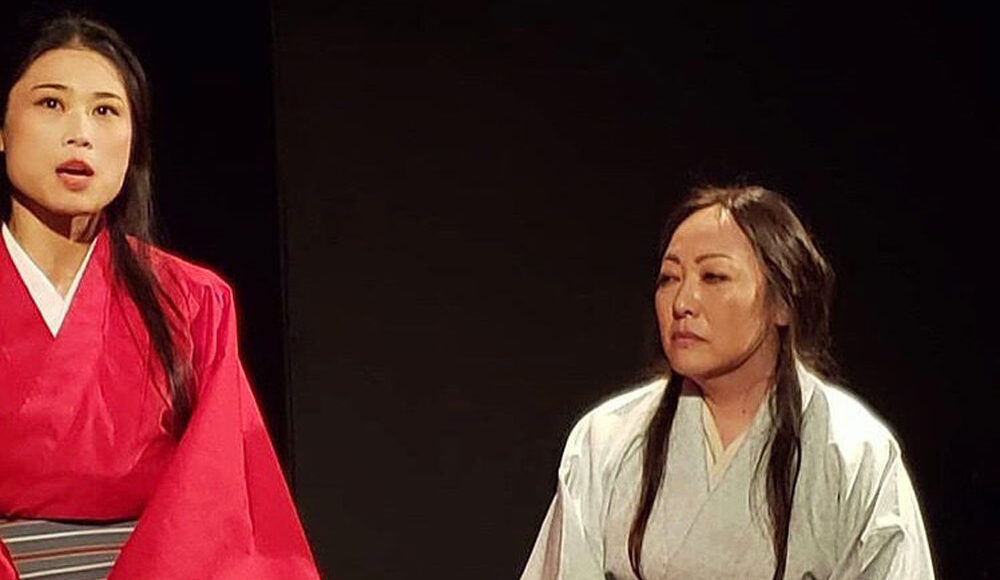By Ernest Kearney — The love story of Lady Shizuka Gozen (1165 – 1211) and the legendary samurai Minamoto no Yoshitsune (1159 – 1189) has been erroneously compared in the West to Romeo and Juliet. This would be justified if Shakespeare had incorporated in his tale the violence of Bonnie and Clyde, threatened his star-crossed lovers with political intrigue comparable to that which destroyed Shah Janan and Mumtaz Mahal, had Mercutio slaughtered 300 Capulets before dying in an upright position and for good measure tossed in a couple of dance numbers.
A celebrated court dancer from humble birth, Shizuka, and her noble lover appear throughout Japan’s classical literature. Their doomed romance was immortalized on woodblock prints by artists such as Kikuchi Yōsai, Katsushika Hokusai and others.
Their sorrowful saga has found its way into Noh plays and onto the stylized stages of Kabuki theatre. They even show up as avatars in popular video games. So drawing on this time-tested crowd pleaser as the bases for Japanese Love Story – Shizuka is not only understandable, but a pretty good bet.
Staged in an historical fashion, the costumes of Yukari Black, Rodrigo Montfort’s orchestration and the scenic design of Kazuyo Horie reflect the blessing to be gained in theatre by the happy union of intelligence with a semblance of budget.
Yet for all the potential of a stage awash in the sweat of manifold actions and glistening with passion’s prickling gleam, Japanese Love Story – Shizuka, running during HFF’21 at The Broardwater, is consistently and perplexingly pedestrian.
Beginning with its quite generic title.
Had King Kong been released as Manhattan Mishap – Big Monkey, I doubt it would have enjoyed the same box office success.
Also plaguing the show is its glacier pacing. This is not due to the traditional tempo associated with ancient Japan, but the lack of urgency in the narrative and the omitted conflict on stage.
The play is heavy with discussions of events occurring offstage. The primary conflict, the rupture between two brothers, is conducted through correspondence without the siblings ever meeting.

Little effort has been devoted to composing the action for dramatic effect, so what little there is doesn’t fume, seethe, rage or thunder but thumps on the stage like a weekday edition of the LA Times flung during a light drizzle.
The abruptness and brevity of the dramatic events on stage denies the play any buildup to discovery while defusing all hope of tension. This is so, even during the scenes between Shizuka (Tomoko Karina) and Yoshitsume (Jonathan Huynh Mast) building up to their romance in which the passion between them rather than raging sparks a bit.
The performances also suffer from a creative ennui and a lack of purpose. Tony Kim as the loyally fierce Benkei manages to show some fire, as do certain scenes between Yukari Black, as Kotoji the dancer’s old retainer who recounts her mistresses’ saga, and Amery Ken Thao as the Chinese priest who arrives on stage just in time to hear it.
Thao and Black serve excellently to bookend the narrative; however, the problem is the time given to establishing this device and then its repeated employment which distracts focus from where it should be fixed.
You don’t want any extended scene of Prince Escalus and Juliet’s Nurse bemoaning the young lovers’ fate.
Regrettably, I feel this show was strangled by a ligature woven from Tomoko Karina’s hyphens, the writer-director-lead actress of the play. Now whether Ms. Karina is a master of all these skills, one or none, I cannot determine and will not guess. However, I can state that in attempting to exercise this trio of disciplines simultaneously she has defeated herself.
As a mentor once explained to me using the circus as her allegory, “The only performers you’ll ever find in all three rings are clowns.”

Yet, Ms. Karina and her production, despite its faults, blips and blunders does deserve praise.
Any show this ambitious featuring an ethnically diverse cast and helmed by a woman should be commended on principle.
Additionally, as an autodidactic historian working to overcome his Eurocentric limitations, I appreciate Ms. Karina’s effort to educate me.
For that effort a SILVER MEDAL.
_________________________________________________
* * *
The Broadwater
6320 Santa Monica Blvd.
_______________________________________________
* * *
For Show Updates, Tickets and Additional Information Go To:




